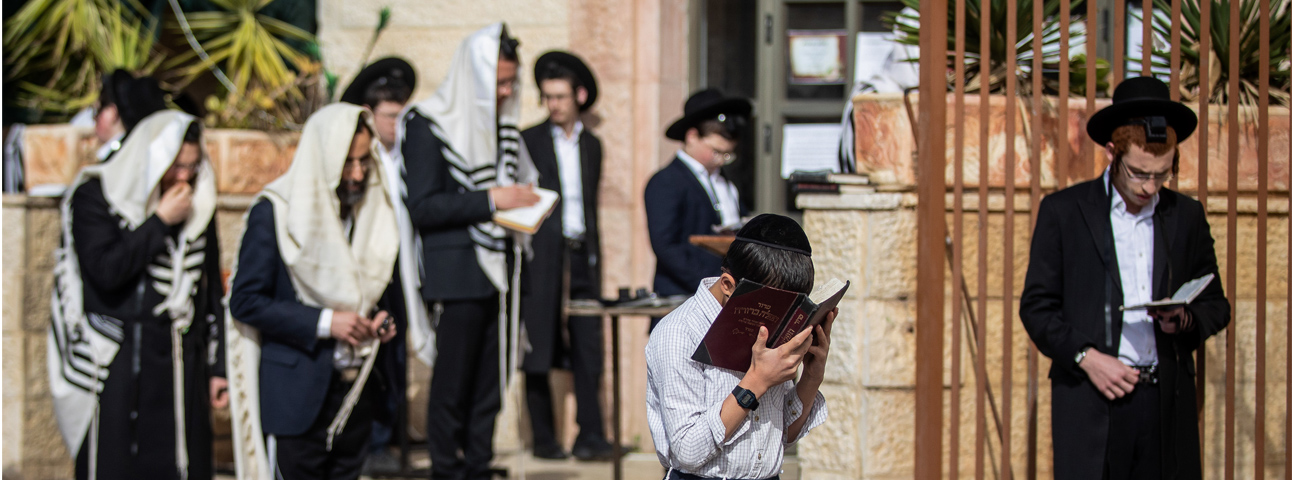Public Health and the Ultra-Orthodox Community in Israel
The lack of exposure to mainstream media outlets and the internet limits this community's access to Health Ministry instructions on the coronavirus.

Flash 90
One of the main subjects of discussion and debate on the fight against the coronavirus pandemic focuses on the ultra-Orthodox community’s compliance (or non-compliance) with Ministry of Health regulations. While we have also seen clear violations of these rules among the public at large, the general impression remains that non-compliance in the Haredi community was far more widespread and blatant, and that life has continued almost as usual in ultra-Orthodox neighborhoods. Undoubtedly, there is a large element of truth in this criticism, but at the same time – we should not ignore the fact that there are several objective factors that make it difficult for the current severe restrictions to be upheld in the ultra-Orthodox sector.
First, relative to the average family size in Israel, ultra-Orthodox families have a very large number of children and live in smaller apartments. This combination contributes to a sense of overcrowding and discomfort for many ultra-Orthodox families, and their situation is made worse by the lack of smartphones and internet use in many ultra-Orthodox homes, and by the fact that ultra-Orthodox educational institutions simply do not have the wherewithal to provide distance learning.
Moreover, the lack of exposure to general media outlets and to the internet, limits both the access to Ministry of Health instructions, and to detailed information on the negative impact of the coronavirus. Thus, while the general public was informed by experts frequently and on an ongoing basis ,with regard to the rapid pace at which the virus spreads, the ultra-Orthodox public, particularly those who are not exposed to online information, received only partial and limited information from the main ultra-Orthodox newspapers.
Having said that, the government is facing a formidable challenge. Since ramping up enforcement is unlikely to be sufficient to address the problem, other more creative and more intelligent options should be explored. One very promising alternative is to pursue closer collaboration with Israel’s ultra-Orthodox municipalities. Almost half the ultra-Orthodox population in Israel resides in municipalities with an overwhelming ultra-Orthodox majority. Nevertheless, not enough is being done by the Ministry of Health and the government to work with these municipalities, to ensure that the published instructions reach their residents. This may be because the Ministry of Health, unlike other government ministries, has almost no interaction on a regular basis with municipalities and local authorities, whether ultra-Orthodox or not.
Collaboration of this sort has several clear advantages: From a practical standpoint, ultra-Orthodox municipalities are able to easily disseminate information to residents; for example, via municipal hotlines. More importantly, these municipalities can serve as go-betweens that are able to communicate with ultra-Orthodox residents in their own language and in a culturally sensitive manner. Naturally, ultra-Orthodox residents have far more trust in their municipal political leadership than in mainstream state institutions. Finally, the close familiarity of the leadership of ultra-Orthodox municipalities with the reality on the street, alongside their understanding of the severe consequences of the virus, allow them to raise early warnings about the level of (non-)compliance. An excellent example of this was provided by the head of the ultra-Orthodox local council of Kiryat Ye’arim, Yitzhak Ravitz, who, last week, was one of the first to caution about the difficulty in controlling the spread of the coronavirus in the town, and asked for closures and shutdowns to be put in place.
Even if the situation in ultra-Orthodox municipalities is not perfect, it is still very far from the negative image of the 19th-century shtetl. In recent years, these municipalities have undergone significant processes of upgrading their human capital, in close cooperation with the Ministry of the Interior. The results are evident. The dual function of these municipalities- in representing the ultra-Orthodox public to the central government, and at the same time serving as government agencies that apply the state’s powers toward this public, enables them to play a significant role in advancing government policy in a considerate and informed manner, and while taking into account the values of ultra-Orthodox society. To this end, the government should learn how to work closely with ultra-Orthodox municipalities and build mutual trust. The coronavirus crisis offers an excellent opportunity to embark on this process.
The article was published in the Jerusalem Post.
